Most experienced RV travelers will tell you that air conditioning is an absolute necessity.
Unless you are traveling n the mountains or camping n the winter, chances are you won’t get a good night’s sleep without a properly functioning rooftop RV air conditioner.
Unfortunately, RV rooftop air conditioners are all too easy to forget about. Right up the moment when you have a problem.
If the mercury is rising in your RV and you are in a desperate spot, or you are simply trying to be proactive about the problem, you might be wondering what you can do if your RV’s air compressor isn’t coming on?
Fortunately, there are a few common RV rooftop air conditioner problems that you might be able to diagnose and repair yourself. Though there are also a few that truly need the services of a highly trained professional.
This guide will help you troubleshoot whether or not you can fix a problem with your RV’s rooftop air conditioner, to determine if you truly can do-it-yourself, or if it’s time to call in an air conditioner mechanic.
What Are Common Signs Or An RV Air Conditioner Problem?
Some RV air conditioners will give you signs of an imminent problem. Though there are certainly sometimes when they seem to die inexplicably.
-
Fan Runs But Warm Air Comes Out – This is usually a sign that the thermostat has detected the temperature is rising in the RV and triggers the system to run normally. The fan itself continues to run, but since the compressor won’t move freon, there is no real heat exchange.
-
The RV Air Conditioner Does Nothing – This could be a sign of a problem with the thermostat or a blown circuit breaker causing the entire system to not work correctly. Sometimes something as simple as a dead battery n the RV’s thermostat control can be the culprit preventing the system from firing.
-
The Air Coming Out Is Stale and Air Flow Is Weak – This could be a sign of a few different problems. The RV air conditioner might be low on freon or you have a badly clogged RV AC air filter
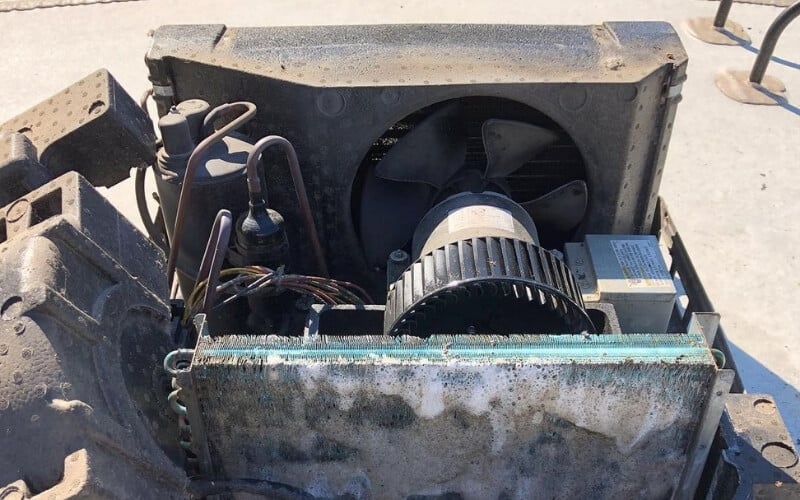
How Does An RV AC Compressor Work
To help better diagnose the problem with an RV air conditioning system, it helps to have an idea of how the system works.
With most RV’s the air conditioner system shares many components with the RV’s heating system.
An RV rooftop air conditioner has two main components: The compressor and the fan. The compressor runs off the RV’s onboard 12-Volt current.
It works by circulating a compressed refrigerant, which is usually, Freon, through a series of coils and special cooling fins.
This essentially exchanges the heat and humidity inside the RV. Though to do it effectively the RV air conditioner’s compressor relies on the fan to blow the cool air across the RV.
The entire air conditioner system is coordinated by the thermostat, which keeps track of the temperature and triggers the system whenever the temperature inside the RV rises to the set degree.
At that point, the thermostat then triggers the compressor and fan to turn on and off. Most RV thermostats rely on one or more capacitors.
They can also be powered by the RV’s onboard 12-volt electrical system or a battery.
My RV’s Air Conditioner Compressor Won’t Start
One of the most common signs of an RV air conditioner compressor failure is the thermostat showing that the system is active and the fan is running, but only warm, stale air comes out.
One of the first things to look at in a situation like this is the RV air conditioner compressor’s capacitors.
It is entirely possible that one or more of them might have overloaded and blow.
This prevents the electricity from completing the circuit thus preventing the air conditioner compressor motor from turning on.
Symptoms Of A Bad AC Compressor Capacitor Problem
The following are some common symptoms of a bad RV air conditioner capacitor. Some of these you can spot in advance, though some are more challenging.
-
The AC system hums as it attempts to start but can’t initiate.
-
The air conditioner system runs for a few minutes and then stops, but doesn’t trip a circuit breaker.
-
The fan blades need a little push to get them started.
-
The Air conditioner blows warm, stale air but the compressor does not function.
What Does An Air Conditioner Capacitor Do?
All capacitors are designed to store a small amount of electric charge to help boost more powerful devices.
In the case of an RV air conditioner system, both the compressor and fan motor rely on capacitors to help get them started.
In some cases, a bad capacitor can potentially explode without damaging any other components in the RV’s air conditioner system.
This sort of thing is especially likely to happen if your RV has gone unused for a long period of time.
If you can open a panel to see the internal guts of your RV’s air conditioner system a capacitor loos like a small battery or button, and on a larger unit you might see multiple ones throughout the system.
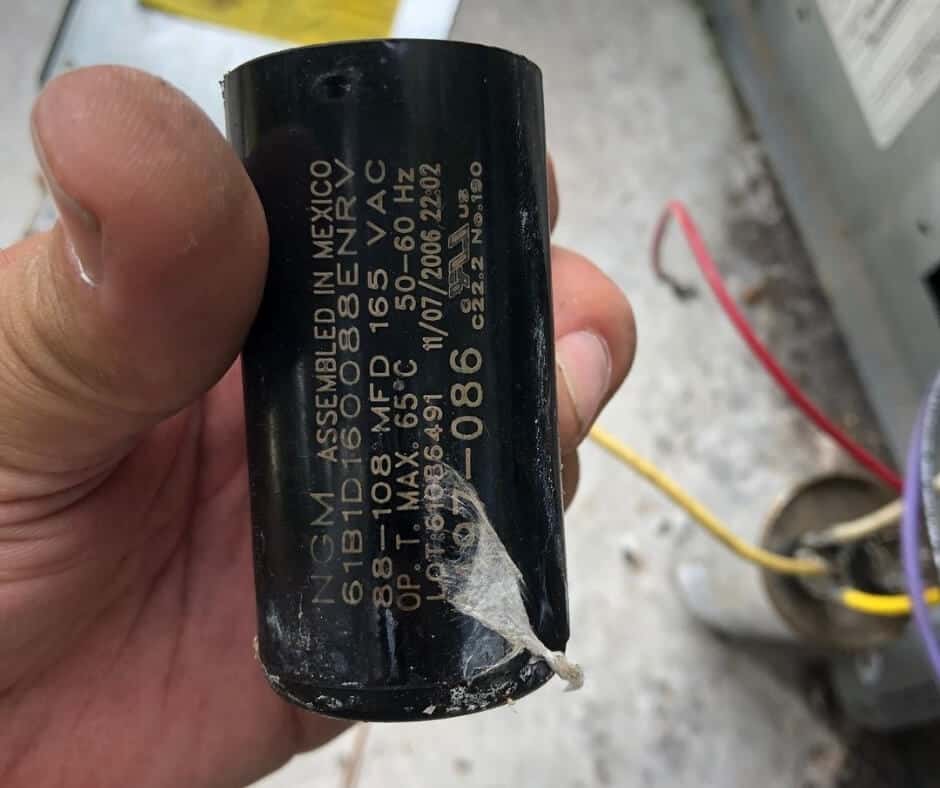
What Does A Bad Air Conditioner Capacitor Look Like?
Let’s say you can get at the electronic guts of your RV’s air conditioner system to hunt down a suspected bad capacitor.
Sometimes you will notice signs of a burned-out capacitor in obvious black marks or a clearly damaged component.
Though there are times when an internal fault in a capacitor simply isn’t visually obvious.
If you don’t see any immediate visual signs, but you suspect a bad capacitor, you will need to check the suspected bad capacitor with a multimeter.
This involves touching the probes to a good capacitor’s prongs. When you do, the display will show a value that gradually decreases over time. This doesn’t happen when the capacitor is defective.
To replace the capacitor, you will need to look for the small model number printed on the side or top of the capacitor.
Then replacing it is simply a matter of using a soldering iron to loosen and remove the old one, then carefully applying it with the correct replacement and two very small dobs of melted electrical solder.
Checking Other Components Of Your RV’s Air Conditioning Compressor
While air conditioner system capacitors problems are the most common culprit in a compressor failure, they are not the only thing to check.
Check The Air Conditioner’s Start Relays
Start relays can sometimes fail, thus preventing the compressor from firing. You might notice signs of burnout or the relay coming loose.
Burns, smudges, or debris can sometimes build up on the connections, which prevents the current from flowing through.
When this happens the start relay can’t get the compressor to engage. This is a relatively cheap fix if you are near a well-stocked auto parts store.
You can simply take the relay out and bring it with you. The identification numbers will be printed on it.
Check The Circuit Breaker Or Fuse Panel
Sometimes a circuit breaker can trip or a fuse can burn out, and still look like everything is fine.
Then when you give it a closer look, it’s clear that the trigger is indeed flipped or the fuse is indeed bad.
This simple little fault can prevent necessary power from getting to the air conditioner’s compressor.
Compromised Valves
Broken or stuck valves can directly affect the functionality of an RV air conditioner compressor.
When this happens the refrigerant gets to the compressor inlet as a liquid rather than a gas.
This is one of those things that ride the line between something you can fix yourself or if you need to call in a professional.
Check The Air Conditioner Filter
A lot of RV air conditioner systems have an air filter in the air return. If you haven’t cleaned it in a while or ever, there might not be sufficient airflow coming back into the system.
Try replacing the filter or thoroughly cleaning it, if it’s a reusable filter. Then reset the circuit breaker connecting the RV’s air conditioner system to the onboard 12-volt power.
How To Tell If Your Compressor Is Bad?
If you have gone through and checked the capacitors, the startup relays, and made sure the filters are clear, then chances are the fault is inside the compressor itself.
This could be something like a burned-out bearing or another mechanical failure that is beyond your control.
This is usually the point where you need to call in a professional mechanic to diagnose the situation.
Especially if the compressor feels alarmingly hot smokes or shows outward signs of burn damage. These are usually signs of a major internal mechanical failure.
Frequently Asked Questions
Can Low Refrigerant Levels Can The RV AC Compressor To Fail?
Technically, yes an RV AC system that is very low or out of refrigerant will not produce cold air.
Though this is usually not something that jumps up and catches you by surprise.
Usually, an RV air conditioning system that is low on refrigerant will gradually perform worse and worse over the course of weeks or even months.
Can I Just Use The Motorhome’s AC To Keep The RV Interior Cool?
While the motorhome’s dash AC might be able to keep you cool while you drive down the road, it will likely not be sufficient to cool the entire RV through the course of a long day or a hot night.
Not to mention the fact that you would have to leave the motorhome’s engine running all night long.
In a pinch, you might be able to get by doing this, with the strategic placement of a fan or two, but it’s not an effective long-term solution to an RV air conditioner compressor problem.
Conclusion
RV air conditioner compressor problems are certainly a headache that you don’t want to let ruin your RV vacation.
While preventive maintenance will certainly help, there are none-the-less times when your RV’s rooftop air conditioner is going to have a problem.
Keeping a multi-meter onboard your RV at all times and some other basic tools like a soldering iron will go a long way toward diagnosing a problem and perhaps even repairing it yourself.
Start by checking the fuse or circuit breaker for signs of a problem. Then give the filters and the thermostat a good hard look.
These are simple non-intrusive things that are easy to eliminate. From there, you can check the capacitors and the start relays to see if they show any obvious signs of a fault.
With a little luck, you might be able to fix your RV’s air conditioner compressor, without having to shoulder a spendy mechanic bill.

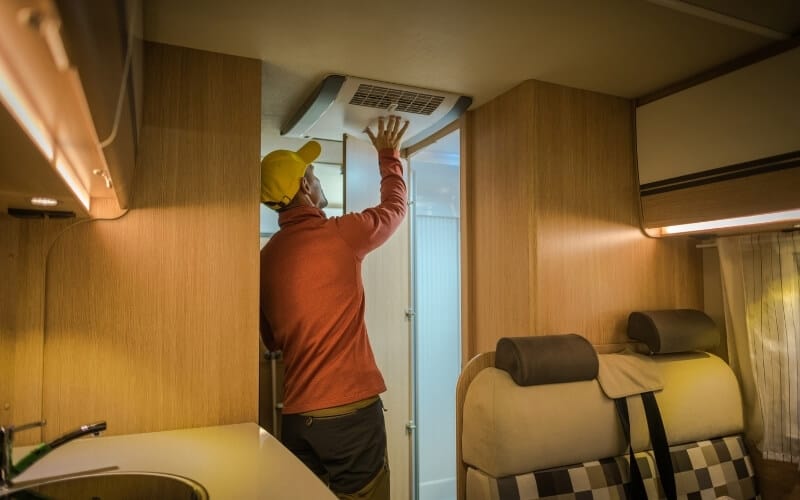
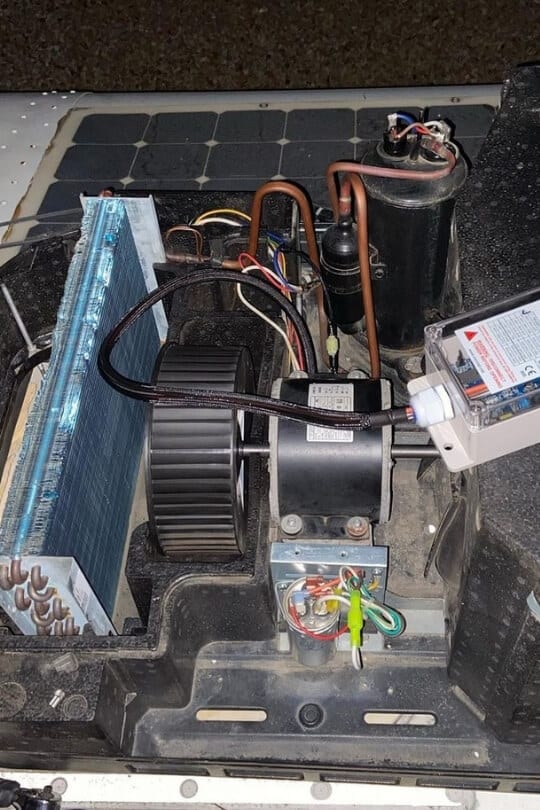


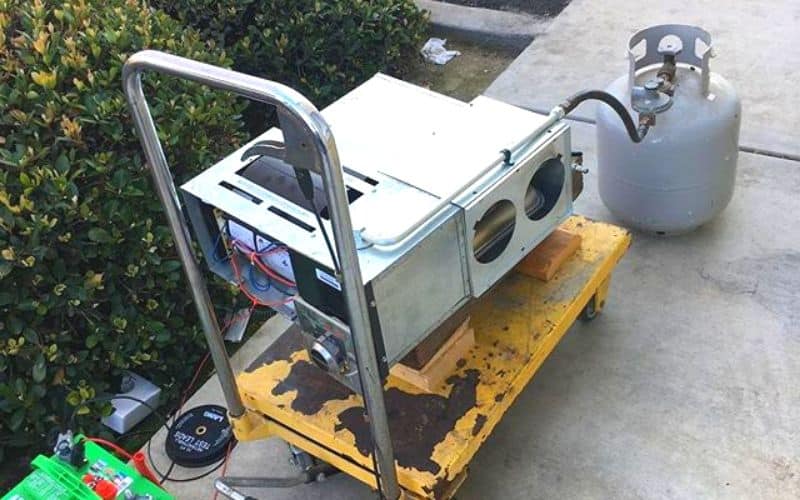
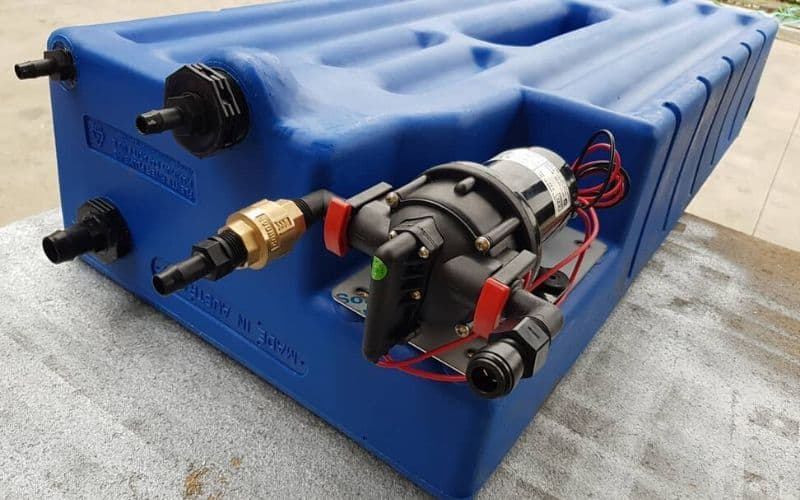
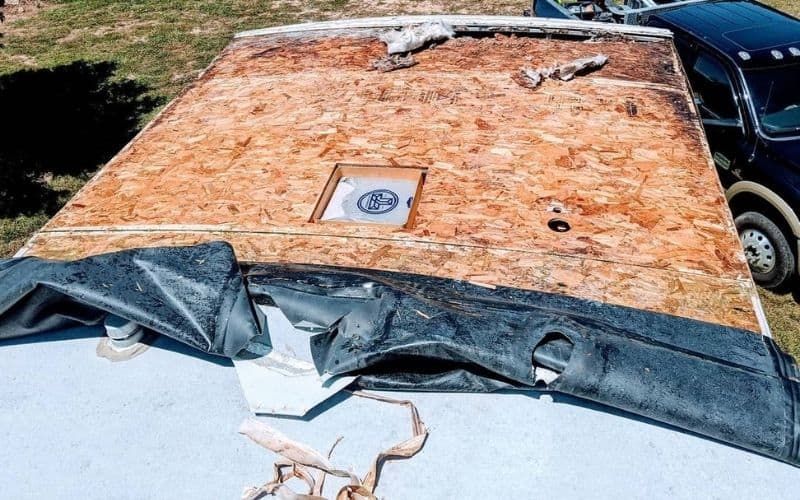
7 Comments
Esteban
2 years agoThe rooftop AC runs on 120 volts, not 12. That’s why it won’t run without shore power. I have wired two of these things and both take 120 volts. I am not saying that none are designed for 12 volt systems. I am saying I have never seen on that does.
Will
2 years agoThe relay on an rv air conditioner is integrated on the control module. It’s fed by 120 volt, turning on the system will engage the relay and send 120 volt to the compressor. You cannot just take that relay out and run to autozone to get a new one, also you forgot to mention that low freon will freeze up the coils and restricts airflow and the system is producing less cold air.
Billy Rutherford
12 months agoI have a Colman 7000 roof top AC and my compressor wants to start I can hear start but stops,and the fan works good what could be the problem with it?
Aaron
11 months agoIt sounds like there could be a few possible issues with your Coleman rooftop AC compressor:
1. Low refrigerant – The most common problem is low or leaking refrigerant. The compressor requires refrigerant to function properly. If it’s low, the compressor will try to start but then shut off shortly after. You may need to have the AC serviced to recharge or repair the refrigerant line.
2. Faulty compressor – If the refrigerant level is normal, the compressor itself could be malfunctioning. The compressor contains mechanical parts like pistons, valves and seals that can wear out or break over time. This would need to be diagnosed and repaired by an HVAC technician.
3. Electrical issue – There could be a problem with the power supply to the AC unit or the internal wiring/components. The compressor may not be getting the proper voltage to start and continue running. This would also require testing by a technician to troubleshoot.
4. Thermostat problem – If the AC’s thermostat is malfunctioning, it may not be properly signaling the compressor to start or stay on. The thermostat would need to be tested and possibly replaced.
5. Overload switch – The AC unit has an overload switch to prevent overheating. If this switch has tripped, it will shut off the compressor. You may need to have the unit serviced to determine the cause of overheating and have the overload switch reset.
The most likely possibilities based on your description seem to be low refrigerant or a compressor issue. My recommendation would be to have the AC unit checked by an RV service center or HVAC technician as soon as possible. They can do proper testing to determine the cause of the problem, perform any necessary repairs or part replacements to get your AC compressor working again.
Eddy
10 months agoWhen I turn on my 3rd ac in my 2018 heartland landmark the fan kicks on but when the compressor tries to kick on the microwave resets and the compressor doesn’t kick on….
Jamie
9 months agoMy ac unit comes on but compressor fails to kick in therefore blowing hot air only
Richard Becker
9 months agoHi… This comment/story includes a “Work Around” solution to a problem that I have been working on for some time now. (I hope that this will be helpful to others that are having similar issues with their Fleetwood Motorhomes)
HISTORY: I purchased a 1999 Fleetwood Pace Arrow Vision Motorhome in 2020. The coach was/is in good condition but I soon discovered that it had some “issues” with the Front Air conditioner. ( The Back Always worked fine. ) The main issue is the fact that the Front AC’s compressor would shut down ( or be SHED ) before the coach was even close to being cool. After going through YouTube I discovered that this was a common problem that MANY had worked on but could not resolve. The following is the process that I went through to achieve a “reasonable” solution”
(1) My first action was to Replace the AC thinking that it was “Weak” because of its Age. That Did Not Help.
(2) I added an In-Line AC Line Voltage Smoothing unit to to the AC side of the compressor thinking that it was being “SHED” due to a Spike in the current Draw when the Compressor Kicked on…. This Did Not Help
NOTE: I could get the front and Back AC’s to work together at the same time on occasion but once the Front AC’s compressor was “SHED” it would not Restart.
(3) To “Save on Power” and to hopefully avoid the “Shedding” problem I modified the electrical input to the Refrigerator so that I could switch it between Gas and Electric Manually. That is normally an automatic process, if the refrigerator detects Shore Line Power. I diverted the AC Line so that I could select or not select Shore Line voltage with a switch…. This Also Did Not Help…
(4) With continued trouble shooting and Brain Storming I turned my attention to the Electronic Climate Control unit and to the Temperature Probe. ( Mine is Intellitec #00-00591-002 ) Believing that this might have bearing on the problem I purchased one off eBay. These units are 20years old and no new ones to be found. Unfortunately the unit I received was worse than my original so I uninstalled it and returned… This too Did Not Work.
(5) As mentioned in #4 I was also thinking about the Temperature Probe…. That’s when I discovered something Really Interesting… My Coach has ducted AC Vents and I realized that the Temperature Probe for the Front AC was in VERY CLOSE proximity to one of the Vents. Well I thought to myself “Well this is Pretty Stupid… Of Course the Temperature Probe is going to show that Coach has Cooled down and in response Turn Off the Compressor… a Eureka moment. I began a search of the internet looking for Newer models of my coach and Low and Behold I found that they (Fleetwood) had in fact Moved the Temperature Probe from High on the wall to a spot lower just above a Light switch.
Well I moved the Temperature Probe down to the approximant same position as Fleetwood had done in the Later coaches… Well IT DID NOT FIX the problem. It was now Much better because the Compressor would stay on longer but once it shut off it would not come back on, on its own. It was being continuously SHED.
(6) Finally a LIVABLE Workaround: I finally turned my attention back to the Climate Controller. Reading the documentation provided I found that the controller will send a 12volt signal to the AC compressor relay whenever it has determined that the requirements for such action has been met. I decided to FORCE the activation of that 12volt signal by adding a 12volt line to the appropriate compressor lead that is controlled by a toggle switch. Eureka it Works… now whenever the front AC compressor shuts down And the Coach is Not Yet Cool, I can just flip the toggle switch and FORCE a 12volt signal onto that lead turning on the Compressor…
WARNING: This forces the Compressor to STAY ON. it WILL NOT turn off automatically even if you turn off the AC at the Control Interface. YOU MUST flip the switch to the OFF position to disengage the Compressor. BTW this is exactly what happens when you set the TEST SWITCH on the controller.
In conclusion I hope these comments are of some use to those that have been tracking down similar problems…
Thanks